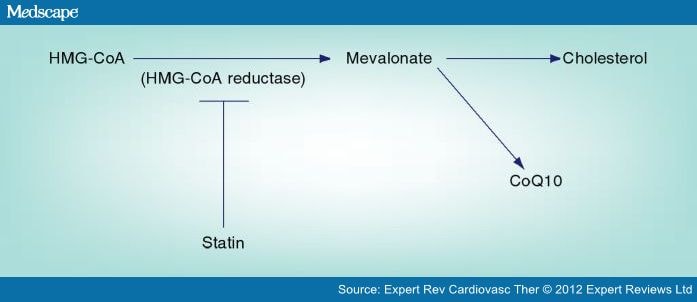Abstract and Introduction
Abstract
Statins are a standard of care in many clinical settings such as acute myocardial infarction and for patients having or at risk of cardiovascular (CV) disease. This is based on a plethora of data showing reductions in CV events and mortality. The CV benefit of statins can be partly explained by their ability to inhibit of HMG-CoA reductase, which subsequently lowers cholesterol and decreases the formation of mevalonate. However, the inhibition of the mevalonate pathway decreases the formation of coenzyme Q10 (CoQ10) within the body. It has been a long-standing theory that statin-associated muscle pain (myalgia) is caused, or at least partly contributed by, a reduction in CoQ10 levels in muscle mitochondria. One of the main side effects of statins is myalgia, which causes the patient to either stop their statin or significantly reduce the dose of their statin. The question of whether CoQ10 can help treat statin myopathy is a common one encountered by clinicians in current day practice.
Introduction
One of the main side effects of statins is myalgia or muscle pain.[1] This is a subjectively reported adverse effect, with an incidence of approximately 10–11% in statin users.[1] This differs from myopathy, which is myalgia plus creatinine kinase (CK) elevations or rhabdomyolysis, which is a CK elevation above 10,000 U/l usually resulting in renal failure, both of which are rare events during statin treatment.[2]
A potential explanation for statin myalgia has been the depletion of coenzyme Q10 (CoQ10) within the body.[3] CoQ10 is a fat-soluble antioxidant that is a cofactor for mitochondrial energy production.[3] It is present in almost every single cell in the body and found in dietary fat.[3] The inhibition of 3-hydroxy-3-methylglutaryl-coenzyme A (HMG-CoA) reductase by statins not only inhibits the synthesis of cholesterol but also blocks the mevalonate pathway, decreasing the formation of CoQ10 (Figure 1).[3] The reduction in CoQ10 may decrease mitochondrial energy production and result in the presentation of myalgia while an individual is on a statin.[3]
Figure 1.
Inhibition of HMG-CoA reductase and the mevalonate pathway by statins. CoQ10: Coenzyme Q10; HMG-CoA: 3-hydroxy-3-methylglutaryl-coenzyme A.
Clinical trials have shown that CoQ10 may decrease the incidence and/or severity of statin myalgia.[3] CoQ10 is thought to work by replenishing the depleted CoQ10 levels in muscle mitochondria and/or through an antioxidant mechanism.[3] Furthermore, CoQ10 supplementation has been shown to decrease LDL oxidation and improve flow-mediated dilation in several human and in vitro trials.[4,5] LDL oxidation can initiate atherosclerosis and subsequent stroke or myocardial infarction.[5] Thus, supplementing with CoQ10 may help treat statin myalgia and perhaps decrease the risk of cardiovascular (CV) disease.[4,5]
Risk factors for statin-induced muscle pains are vast and include high statin dose, interacting medications, small body frame, surgery, infection, physical exertion, elderly, Asian ethnicity (Japanese or Chinese) for patients on rosuvastatin, female gender, renal insufficiency (glomerular filtration rate <60 ml/min) or elevated creatinine, liver impairment, hypertension, diabetes mellitus, high triglycerides, thyroid disorder (hypothyroidism), hereditary muscle problems, prior muscle problems on statins, hyperkalemia, genetic mutations associated with mitochondrial dysfunction and genetic interactions (Box 1).[6] Therefore, while CoQ10 seems to help in some cases of 'statin myalgia', it is apparent from the plethora of underlying causes that it may not work for all statin-associated myalgia.
Expert Rev Cardiovasc Ther. 2012;10(10):1329-1333. © 2012 Expert Reviews Ltd.










